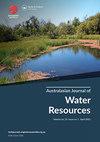Adaptive water management in response to climate change: the case of the southern Murray darling Basin
IF 2.2
Q2 WATER RESOURCES
引用次数: 0
Abstract
ABSTRACT For over two decades, Australia has sought to address the effects of the over allocation of water resources in the Murray-Darling Basin through implementation of the Murray Darling Basin Plan (2012). It is increasingly apparent that the impacts of climate change on surface runoff and water demand will profoundly impact rivers, potentially negating the Basin Plan’s achievements. It will be critical that we use the lessons from the last two decades to inform adaptation to climate change. Environmental water allocations over the last decade have focussed on providing base flows, freshes, and overbank flows, within a Natural Flow Regime paradigm. In a climate-changed world managers have three broad options. The first would be to continue to pursue single loop adaptive management making improvements within the existing framework. The second option would be to adapt the system approach to focus on a subset of sites, akin to maintaining aquatic reserves. The third option would be to move flow management away from the natural flow paradigm to a more functional regime. This approach would invoke the second adaptive management loop by evaluating options for adaptation and developing processes for navigating trade-offs among social, economic, cultural, and environmental values and between protection, restoration, and adaptation. Changes in water availability because of climate change will require more than incremental adaptation (first loop adaptive management) and will necessitate consideration of either protecting a smaller suite of spatial areas or a smaller set of functional outcomes. This requires profound change to some of the Basin Plan’s approaches to environmental flow management. The review of the Basin Plan in 2026 provides a rare opportunity to adapt the Basin Plan from a foundation of protect and restore to one that includes adaptation, and this will require substantive changes to the Basin Plan (second loop adaptive management).适应气候变化的水资源管理:以默里达令盆地南部为例
本文章由计算机程序翻译,如有差异,请以英文原文为准。
求助全文
约1分钟内获得全文
求助全文
来源期刊

Australasian Journal of Water Resources
WATER RESOURCES-
CiteScore
5.10
自引率
21.90%
发文量
25
期刊介绍:
The Australasian Journal of Water Resources ( AJWR) is a multi-disciplinary regional journal dedicated to scholarship, professional practice and discussion on water resources planning, management and policy. Its primary geographic focus is on Australia, New Zealand and the Pacific Islands. Papers from outside this region will also be welcomed if they contribute to an understanding of water resources issues in the region. Such contributions could be due to innovations applicable to the Australasian water community, or where clear linkages between studies in other parts of the world are linked to important issues or water planning, management, development and policy challenges in Australasia. These could include papers on global issues where Australasian impacts are clearly identified.
 求助内容:
求助内容: 应助结果提醒方式:
应助结果提醒方式:


